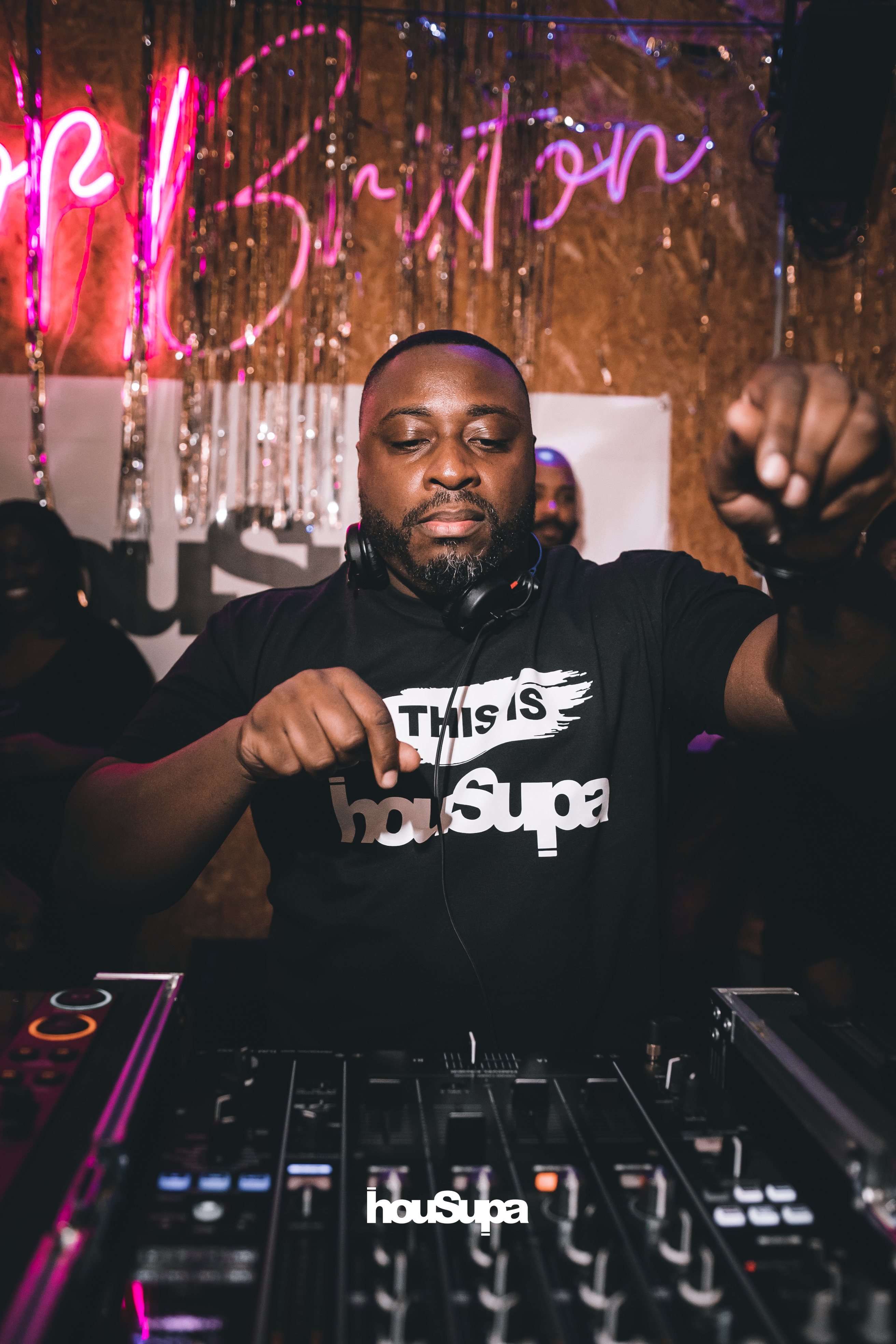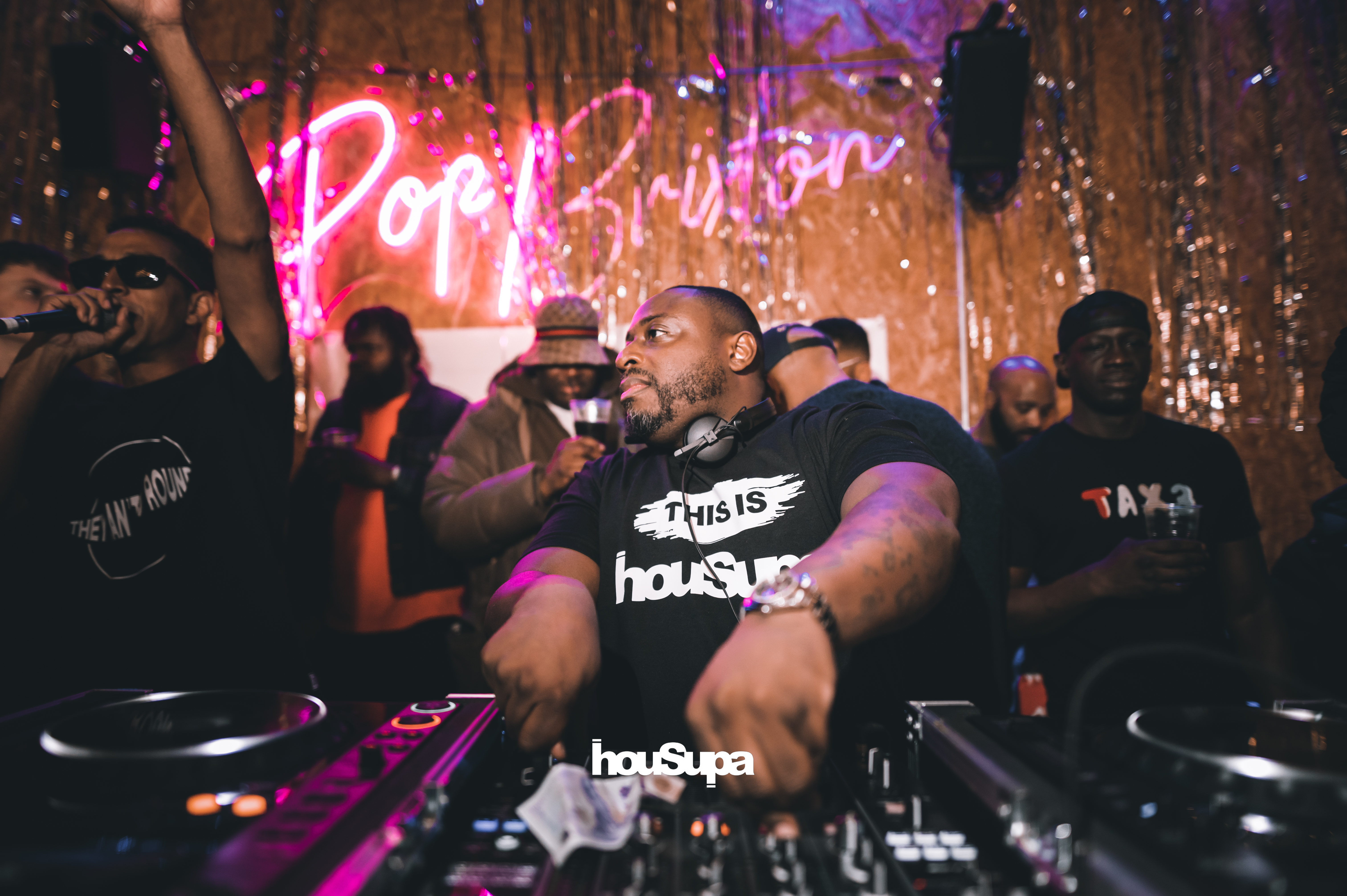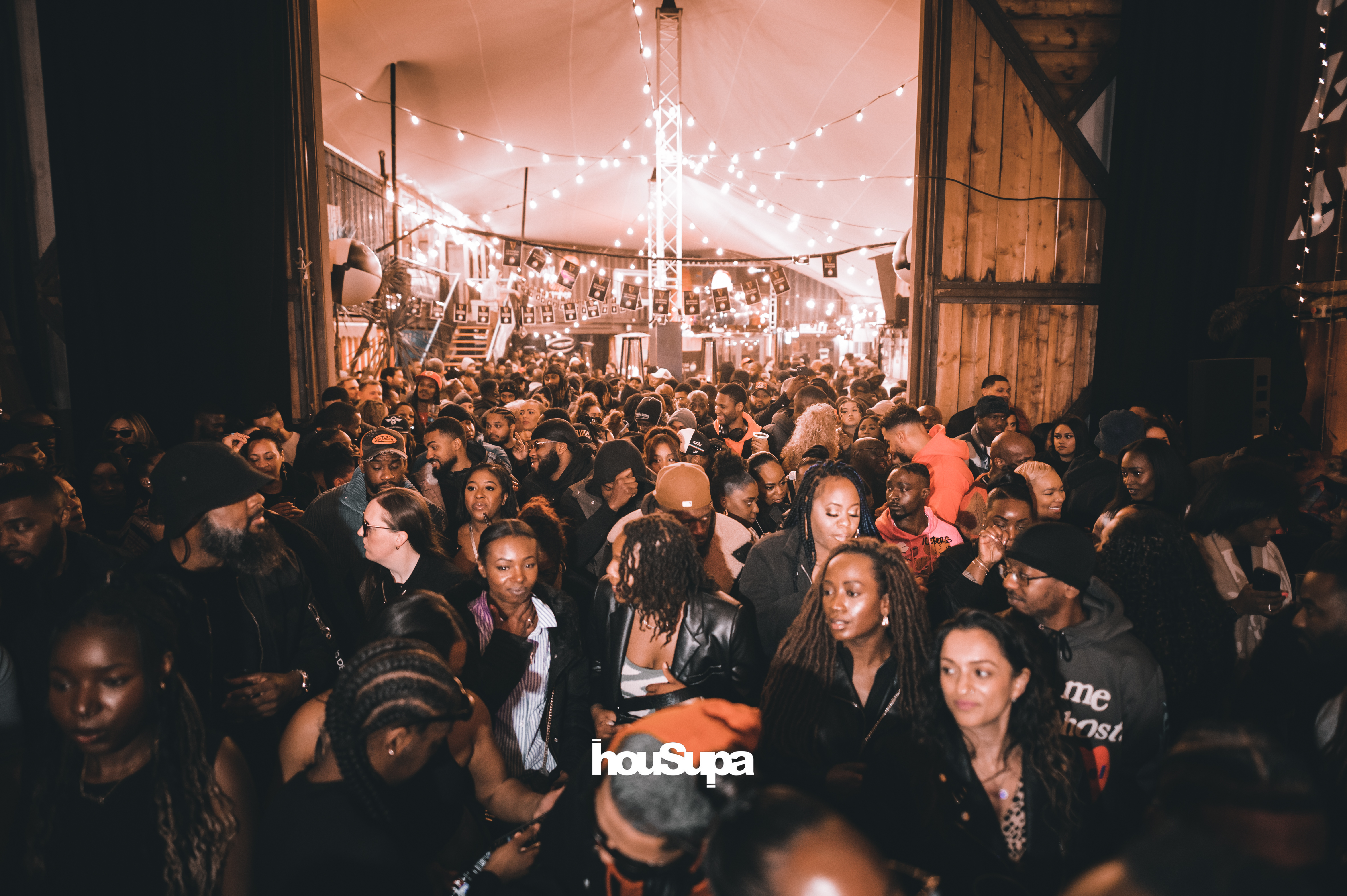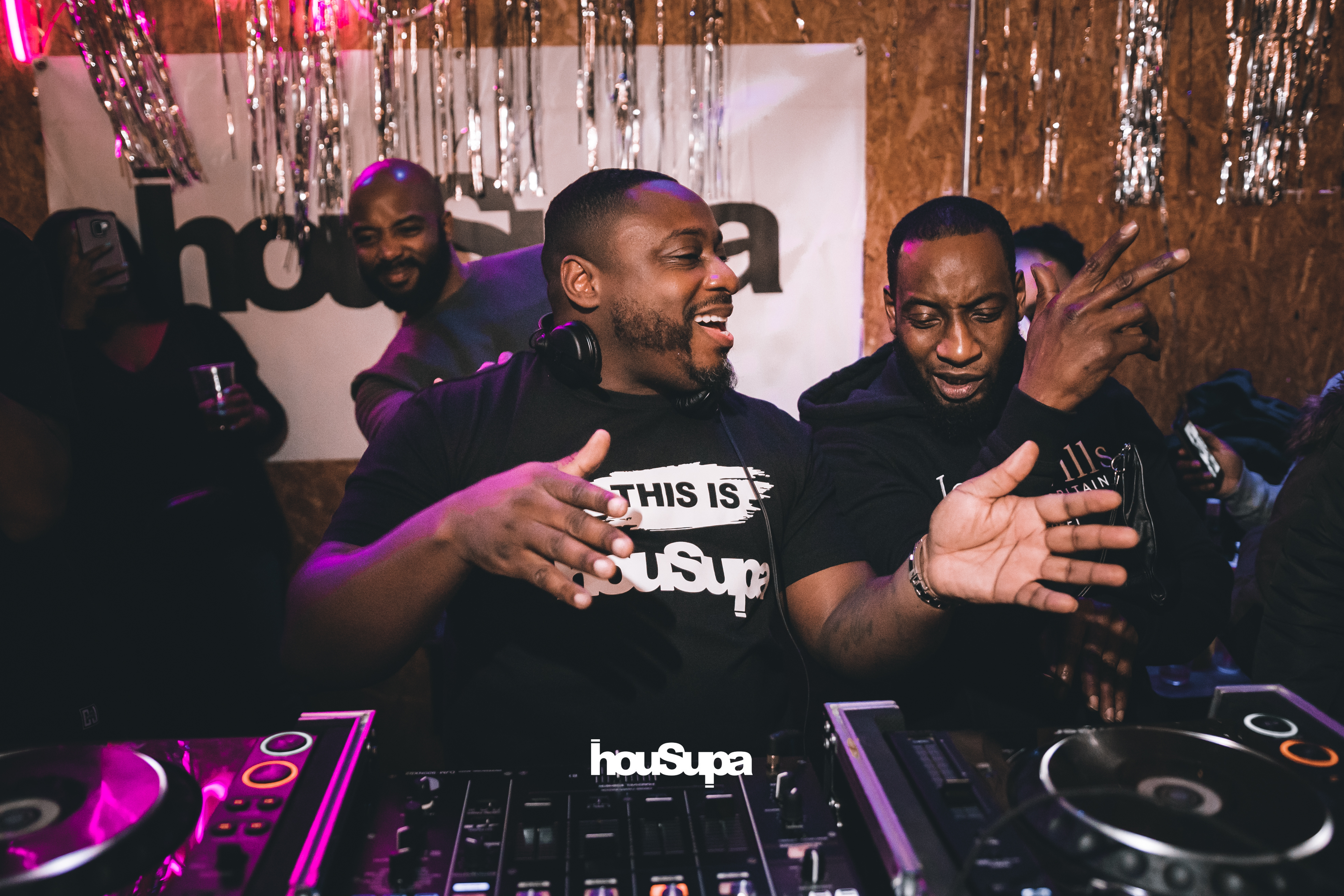Supa D and houSupa – “Our sound, our world, our vibe”
This interview forms part of 'Crossover and collectivity: why London’s house underground is evolving'. It has been edited for clarity. All photos courtesy of houSupa and Jerome Kidman.

Pushing two decades of active involvement in London’s underground music culture, Supa D is a UK house legend.
To say someone like Supa D is a key figure in one ‘scene’ would be an understatement: along with his longtime DJ partner Pioneer, his fellow Circle crew members Kismet, Feva and IC, and contemporaries like Sef Kombo, Petchy, Wigman and others, it would be better to describe him as a key figure in an underground house music ecosystem. This is a London ecosystem of DJs, producers, promoters, radio stations, venues and networks that has been built outside of and in parallel to the predominantly white and middle-class “House and Techno” establishment, with its closer ties to major labels (and their subsidiaries), PR and communications agencies, and transnational music media.
Frozen out of this establishment and its institutions due to racism and classism, the recent histories of the subgenres and scenes that Supa D has been part of – soulful house, funky house, Afro house, deep and tech house – were effectively erased by the music journalism of the late 2000s and early 2010s (see 'A Letter to RA'). When the story of UK funky made it through, Supa D and his peers were usually left out of the picture, and the subgenre appeared as a flash in the pan rather than being fully contextualised within the developments of this house ecosystem.
After many years building a loyal crowd of ravers through his event brand houSupa, Supa D now plays in London at busy clubnights nearly every weekend. Following the success of his Afro house-centred party Afrotized, Supa D expanded houSupa into a label of the same name in 2019, founded to push the Afro, soulful house and amapiano-influenced tracks being played by himself and close associates. With group photos circulating of the crew proudly wearing houSupa t-shirts at its launch, the label is formed from a community, and has become a respected, regular home for producer-DJs who had previously released music sporadically on disparate labels.
With all this behind him, Supa D remains humble, focusing on what he wants to do next, how he could be doing more, and on making the right moves to maintain the community that supports his ventures in music. Now that amapiano has injected a fresh set of sounds and a certain amount of hype into the Afro house movement, he remains concentrated on his label showcase events, quality control, respect for South Africa’s originators, and on elevating his collective.
NKC: How did you get started out in music, did you go through many other genres before you settled into the house scene?
Supa D: I first started in the jungle days. I was collecting jungle vinyl. Then I went through the transition from jungle to garage. I touched on the early days of grime. I was on Deja Vu at the time with the Bachelor Crew. Mondays was when all the crews played – NASTY Crew, Roll Deep, Ruff Sqwad.
That was about 2003/2004. It all got a bit too much and they stopped doing the crew shows on the station, but I was still there doing shows by myself. I worked at a record shop and I was always collecting house tunes, but I didn’t get a chance to play them. One Christmas Day I did a whole show of house and then just continued since.
NKC: What kind of house music were you playing back then?
Supa D: It was soulful house, funky, the early Defected stuff and ’83 West. It was a lot of imports them times, from America. Even today I still play some of those tracks. I was playing all that on vinyl up until about 2007.
NKC: Do you have a musical family?
Supa D: My dad owned sound systems, so I was born into it. He plays everything. It’s in my genes!
NKC: The way I see the house music scene in London is that it’s gone from soulful house, to funky house, to deep and tech house in the 2010s, and now it’s evolved to Afro house and amapiano. Would you agree with that?
Supa D: It’s gone round in a circle, basically. It was always there, but now everyone’s jumped back on it, that’s ultimately rebirthed it again. Loads of us didn’t give up on it, basically. Sometimes it’s about doing what you believe in, and once there’s good quality music out there, you can’t go wrong.
NKC: You DJed in the deep and tech house scene as well, but would you say that soulful and Afro house is closer to what you believe in?
Supa D: Yeah, the Afro, soulful, amapiano – that’s my vibe. The deep tech stuff, I liked some of it. If it’s got a nice groove to it, I can work with it, but on a whole it’s soulful, Afro, and amapiano for me.
NKC: Would you say the Afro sound is as popular or more popular than the deep tech sound in London?
Supa D: It’s hard to explain, it’s two different scenes. Deep tech is still there and it’s still big, and there are big events. That’s never going to go away. The Afro house and amapiano side of things has big events too. Then a lot of people cross over as well.
They’re both big in their own way. Deep tech has always been there and it’ll always probably be bigger because it’s more universal. Afro house has still got a way to go, but it’s up there still, and I want it to get bigger.
NKC: There’s a lot of crossover with some event lineups, there are people from both genres on there.
Supa D: You’ll have one room with all of us lot in there and then you get the next room with all the deep tech DJs. It goes hand in hand, all under the same house umbrella.
NKC: What made you decide to start up Afrotized in 2018?
Supa D: Afrotized is somewhere where you can not play the main top ten club tracks in our scene. It’s for the music that you don’t normally hear. People come play new tunes, underground tunes, not the same regular tunes that people always want to hear. That was the main idea of it.
It was more Afro house to start with, the amapiano came in at the beginning of 2019. There was a lot of people playing it, or playing certain tracks, but no one would know what it was. They didn’t know it was amapiano, they would put it all under the same Afro house banner. We were playing them together, even if we were speeding it up. We were making it fit into what we play and how we play.
That’s where we might be different and do things different compared to the SA DJs, where everything is set at one tempo. We would jumble and mix it up, and make it work in our world and our vibe.

NKC: You’ve mentioned before that what appeals to you and your crowd with amapiano is the basslines. Why are the basslines so important?
Supa D: When I was growing up, coming from the soundsystem thing – heavy basslines and a good soundsystem, it always creates that vibe. A lot of ama tracks are bass-driven. When it hits you, especially with a good system, you ain’t got no choice not to move and hold a vibe.
Everyone loves that vibe. When the music hits you and you’ve got a proper system, you can’t really go round it.
NKC: Why did you launch houSupa as a label?
Supa D: It was part of my own personal goals, to have a record label, to have events. It’s a whole umbrella. I wanted to get something out there and have a platform for up and coming DJs and producers, to try to keep the scene alive, and to let people know what we’re doing over here.
NKC: It’s been one of my favourite labels over the last few years, and you kept pushing a lot of new dance music out there even during the pandemic.
Supa D: We’ve got a good collection of producers on the label. There’s a lot of stuff to come. There’s going to be more vocal stuff coming out in 2023, and people are teaming up. I’m always open to new producers. If I hear something and someone reaches out, I’m always open to them jumping onboard.
NKC: 'King and Queen’ was a massive anthem on houSupa and then got picked up and re-released by a major label – Sony – did that change anything for houSupa?
Supa D: It’s a tricky one. With that, it was a learning thing to see how certain things are.
It’s good – it’s knowing that it’s not about the money sometimes. I felt like it could have been pushed more on their side – you’re expecting that to happen.
It didn’t make us disheartened, it just made us think, ‘okay, what difference are they making, really?’ We’ll just carry on pushing, doing what we’re doing. It’s about recognition – getting people from over there to come and see what we’re doing over here. That was the main thing.
NKC: So through that you found out that you have enough power to do it all yourselves?
Supa D: I felt like we had the power to get their attention, that’s how we did it in the first place. You have a vision in your head of working with a major label… You’re thinking, ‘rah, why aren’t they doing this and doing that?’ Anything that’s been done was off our own back. Certain people playing it on radio, it was all people that I know, that were playing it before it got picked up by Sony.
I wanted them to take it to the next level. The underground thing, we’ve already got that, so it was about the other world. But again, it’s a learning thing. You never know, it might happen again and then we might look at it differently and take a different approach.
NKC: How would you describe the houSupa sound?
Supa D: If I hear something and I feel like it’s a vibe, and I know it can work, then I’m all for it. Whether it’s amapiano, Afro house, soulful house – I’m all for it.
There are things that I’ve turned down, loads of people have asked me, but it has to be something that I know could work.
How I look at it is things that I would play myself go on the label. So I’m trusting my judgment. You don’t always get it right, certain tunes are bigger than you expect. Everyone’s got their own taste, but I stand by my experience and my ear.
It’s amapiano, Afro, but with the UK style of it – it’s still got that UK-ness. You can tell the tracks are from the UK. From the beginning, people were just learning the amapiano sounds. Now people are more advanced into it, people sound more like SA producers. But everyone had to go through that transition. They're getting the influence from there, but making it their own.
NKC: I feel like when people are still learning, that’s the interesting bit.
Supa D: Even ‘King and Queen’ – it’s amapiano-influenced, but listening back to it now, most people would say ‘this ain’t amapiano.’ But we were at the early stages of learning and producing it. People have learned more and advanced more along the way. Everyone’s got knowledge and they are talented, so it can only get better.
NKC: Do you see the Afro house scene and amapiano scene as being separate, or do you think there’s so much overlap that it’s like one big scene?
Supa D: You’ve got the Afro house and Afro tech scene, then you’ve got the fully amapiano side, where it’s all raw, and it’s all South African music, then you’ve got our thing, where it’s a cross between all of them, it’ll be a mix. It’s like three different scenes.
Our thing is a blend of amapiano, Afro, soulful. We’ve always done that. We’re bringing in the old soulful classics with a brand new amapiano tune, keeping it all fresh and vibey. You’re giving them something new but you’re giving them the classics as well. That’s how our scene’s always been.
It’s always been a mixture, since the early Afro days. But obviously, everything was just called funky back then! It’s hard to bloody explain to everyone.

NKC: So back in the funky house days, people didn’t realise they were hearing South African house, or tribal house from New York, and they just said that it was funky?
Supa D: All the time, everything – broken beats, tribal house, it was all ‘funky’ at the time. It was the same thing early days when I was playing amapiano at Afrotized. No one didn’t know, everyone just assumed it was Afro house or funky. They didn’t know it was amapiano. But that’s what we’re here for as well init, to introduce and let people know about new music.
NKC: There are a lot of new raves popping up in London in this scene. It seems mostly in the soulful, amapiano crossover scene, your area with houSupa. Why do you think there are so many new raves?
Supa D: It’s like everything, when people see something popping, everyone wants to jump back on it. It was the same thing with funky. When everyone got to run off and do this and do that, no one didn’t want to try to keep the scene alive. It’s like we have to do that – then everyone sees that we’ve built it up again, and then they’re like ‘let’s do this now.’
It’s always going to happen, so that’s why you have to stay ahead of it, at the forefront. The scene can get oversaturated, but then people will learn init. You have to be in it to win it, so if people want to take that chance and jump in, then go ahead. You might be successful, you might not be.
There are new events that have come up that are doing well now – like Dankie Sounds and things like that. Their thing is big at the moment, they’ve got the uni crowd and all that. If they do things right then they’ll have that crowd there for the next ten years.
NKC: You’ve got a really dedicated, loyal crowd in London for the houSupa raves. If a load of new, random people turned up because the sound had got more popular, would that be a bad thing?
Supa D: That’s always good, the more the better. I’ve been doing this for so long, we’ve got a whole new demographic of people, and a bigger age range as well. You’ve got people who are 30-40+ coming out, then you’ve got people in their early 20s coming as well. It’s about holding on to all of that. More so the younger ones, because they’re the ones who are going to be continuing raving for the next ten years. All the 40+, they’re going to sit down in a minute.
NKC: Would you say the demographic has changed then, you’ve noticed that with the crowds?
Supa D: Yeah, definitely. I’ve seen at certain events – you’ve got younger ones, older ones. A lot of the younger ones have just been waiting until they could come out. They hear about it from their older sisters, brothers, mums, dads, whoever it is that used to go to the raves. Now they can go out. My daughter comes now, she’s 21!
NKC: You’ve talked in the past about how the quality control of UK funky wasn’t always there. Is there anything you’re doing differently this time around? Do you select music only from the houSupa camp and South Africa now?
Supa D: You see what it is – now, there has to be quality control. There has to be, we can’t let it get into the funky days. Everyone’s more or less on that same wavelength now. Everyone’s advanced since then. But me, if I don’t like it, I ain’t playing it anyway.
If it’s gimmicky, then it can go left. You can do the gimmick stuff, if it’s coming from the SA people, that’s their stuff anyway, so it’s alright. But us doing it, anything that we come with has to be proper, basically. Because we’ve got more to prove. Over there they’ve got so much talent, it’s like effortless.
Here, we’re trying to feed off their vibe and create our own. You have to respect it. Make it your own but still respect it. Even down to vocal tunes, whatever it is – everything has to be on point, has to be at a certain level.

NKC: You play in London nearly every weekend – do you ever get offers to play in other European cities?
Supa D: Recently I’ve been playing in Dubai, I’ve been a few times this year. I’ve got a lot of things in the pipeline for next year, like Amsterdam, Malta, Portugal. There’s a lot of talks and things meant to be happening, but it’s about getting certain things over the line. It’s about spreading the sound and letting people know what we’re doing over here, and then try and make it branch out, that’s one of the goals.
NKC: Some of the people from the UK funky days – like Roska and Scratcha for example – would play shows in Europe and America, as part of tours and sometimes with smaller promoters. Did you get offers like that or do you think people weren’t aware of what you were doing in funky and Afro house back then? Did you ever turn anything down to focus on playing to your London crowd?
Supa D: I don’t think people were aware. Sometimes it’s about who’s behind you as well. It’s about good management skills and reaching out to different worlds. Sometimes I’m my own worst enemy in terms of not networking properly. To me, I want everything to be organic, but sometimes it don’t work that way.
I’ve played up and down the UK, but not really in Europe. I’ve played in Amsterdam, but a lot of the time, it’s people doing stuff from here when I’m playing abroad. Again, it’s down to a thing on my part, I reckon, as well.
If the booking was something different, I’d look at it as a chance to push what I do to somewhere different. I wouldn’t turn it down. Next week I’m going to Ghana for the first time, that’s with a promoter out there, that’ll be interesting. Obviously, they’re going to be more familiar with what we’re playing, like amapiano. But we’re still going to bring our vibe and how we do it.
For me, that’s closer to home than somewhere in Europe. It’s not the same as me going to Belgium or something.
NKC: The reason I ask is because I don’t think people wrote about UK funky in the right way in the media at the time, so I’m trying to work out if people aren’t familiar with you because of that.
Supa D: With that, I think it’s because I wasn’t really producing back then, that’s what it is.
NKC: You’ve got Mellowbone from South Africa on houSupa, are you collaborating with other South African artists while you’re producing amapiano and Afro house?
Supa D: There’s a couple up and coming South African artists we’re talking to. They’re talented, I’m here to help them in a way as well, in the same wave as the producers over here. Again, it’s a networking thing, being in certain places and letting people know who you are. That’s a thing on my side, where I need to do more.
NKC: How has your label showcase night This is houSupa developed?
Supa D: It started in Dalston, then we went Shoreditch, from there we took it to Pop Brixton, from June 2022.
All the producers that are on the label, they’ll come and do their DJ sets and everyone’s got their new tunes they’ve produced. On the whole it’s based on productions from the camp, new and old. It’s about our sound and what we’re bringing.
We always get someone passing through as well – at the last one Ms Dynamite passed through, she jumped on the mic, it was good.
My main thing is pushing the scene, pushing what we do, getting it out to the masses.